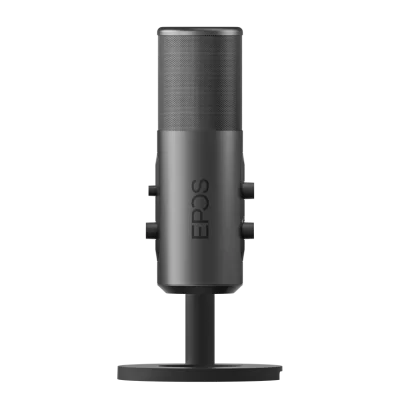When you’re thinking of becoming a professional streamer or podcaster, there are few things more important than the microphone you’re using. After all, if your followers or listeners can’t hear you clearly, then the most important part of your content – your unique personality – will fall on deaf ears. Naturally, there are plenty of companies out there who are creating products for this audience, but they’re not all created equal. Into this world comes the EPOS B20, a microphone geared towards Twitch streamers, podcasters, and other content creators. Will it stand up to its peers or should this mic stay silent?
EPOS B20 – clear, crisp sound
The first and most important thing to note is that the EPOS B20’s sound quality is crisp, clear, and devoid of any worrying artifacting or any other blemishes. We tried speaking into it and playing acoustic guitar into it, and both of the sounds we used were reproduced with excellent clarity by the EPOS B20. The sound profile is just a little wanting for refinement, but of course, if you’re using this as a gaming content creator, that’s not going to matter. The B20 isn’t a studio mic and it isn’t trying to be one; if you want something sensitive enough to pick up acoustic guitar with pin-sharp clarity, this isn’t the mic for you, but for voice content, it’s extremely solid.
Unfortunately, getting to that point does require a little bit of tweaking. There are four different patterns on the mic, and you’re going to want to play with them a bit to find the sweet spot for your particular environment and setup. In addition, you’ll likely have to make use of the accompanying EPOS Gaming Suite software to fine-tune your EQ and get yourself sounding exactly as you want. Out of the box, the mic doesn’t quite cut it, but with just a little bit of work, you can make this microphone sound gorgeous.
Build quality is great, but there’s something missing
We love the build quality of the EPOS B20. Although you shouldn’t be throwing equipment around, we get the sense that the B20 will withstand being dropped or accidentally colliding with something, which is what you want from a gaming content creation mic. Again, this contrasts with super-sensitive studio condensers that will shatter the moment they come into contact with another object, but a sturdy, hard-wearing construction is important with a device like this.
One thing we do feel we have to point out here, though, is that the dials on the mic – the ones that control gain and other parameters – don’t have notches on them. This means that it’s very easy to forget where you left the dial, then switch the mic back on and be greeted either with squealing feedback when you speak or with complete silence. It’s not necessarily a dealbreaker – if you have a good memory, you won’t struggle – but we frequently found ourselves needing to adjust the levels more than we would have liked.
EPOS Gaming Suite software is good, but too essential
If you like to fiddle with options and tweak dials, then you’re going to love the included EPOS Gaming Suite software. This is the beating heart of the B20; it’s how you’re going to achieve the aforementioned great sound with your mic. Here, you can adjust levels, change EQ, and switch up a whole host of other parameters to get the B20 sounding exactly as you want it to. In simple terms, if you’re using the B20 without the software, you’re going to get a vastly inferior experience, so make sure you’ve downloaded it and you’re using it when you hook up the mic.
In fact, it’s pretty much essential to use the software, because you can’t see where your gain levels are at without viewing it within the Gaming Suite app. Again, this isn’t much more than a minor annoyance, but it can be frustrating when you’re firing up your rig and you realise that you’ve forgotten to open the software, so you have no idea where your volume levels are at. A microphone really shouldn’t need a separate software suite in order to make it work.
The B20 should make a great gaming mic
We need to stress here that if you’re looking for a microphone to help you capture musical instruments or any other kind of delicate, multi-layered sound, then you shouldn’t be picking up the B20. Offerings from Rode or Sennheiser will work better for you in this case. The B20 very much knows what it is; it’s a gaming mic that’s designed for shouting to your Twitch followers, and so you’ll need to make sure that you’re in this wheelhouse before you make a purchase.
However, if this is your area, then you could do a lot worse than the B20. It’s still hard to recommend it over the Blue Yeti Nano, which remains the high watermark of gaming and podcasting microphone technology, but if, for whatever reason, you’re not a Blue Yeti fan, then the EPOS B20 is certainly a great option. With powerful software, a great sound profile (once you’ve done the necessary work), and four different pickup patterns to play with, the B20 is a very solid mic overall. Just make sure that you’re aware of what your gain levels are like before you start using it.
Pros
- Crisp, detailed sound (eventually)
- Great associated software suite
- Hard-wearing and rugged
Cons
- Sound takes some dialing in
- Gain dials don’t have notches
- Software is a little too essential


